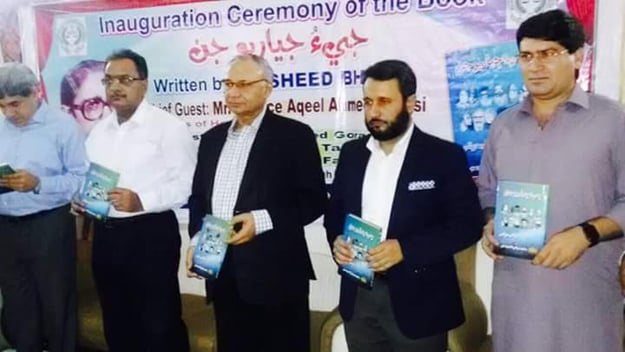
Justice Aqeel Ahmed Abbasi shared these views while launching the book of late writer and lawyer Rasheed Bhatti, titled Jeu Jiyaro Jan [The Person who Inspires Me], at the Sindh High Court Bar Association (SHCBA), Sukkur, on Thursday night.
Bhatti appears to be very honest in painting the picture of some important personalities, such as Abdul Sattar Pirzada, Raheemdad Maulai Shedai and Mohammad Usman Deplai, said Justice Abbasi. He was of the view that writing a verse of poetry or a few sentences is like giving birth and only a select few are blessed with this talent. “No doubt many writers use to write books and poetry but Rasheed Bhatti used to write things with a purpose,” he added.
Justice Abbasi further talked about the law and order in Sukkur. He shared that he was shocked to hear terms like ‘half fry’ and ‘full fry’ - used to refer to police injuring and killing suspects. “In Sukkur, the police was killing and injuring criminals and naming it ‘half fry’ and ‘full fry’, which, according to me, is extra-judicial and extra-constitutional,” he said. “Therefore, I called a meeting with the DIG, SSP and other officers and made it clear to them that this practice was simply intolerable. Our job is to dispense justice.”
Paying tributes to the late Bhatti, poet Ayaz Gul said that as a student, he learnt a lot from him. “No doubt he was a lawyer by profession but dedicated most of his time to writing,” he said. “He loved Sindh as his motherland and struggled for its rights throughout his life.” According to Gul, Bhatti wrote many books but Jail Ji Diary [Diary of the Jail] and Jeu Jiyaro Jan are his two most important works.
Prominent writer, analyst and journalist Mumtaz Bukhari said that Bhatti was a man of words and he really meant what he wrote about the different personalities of Sindh. He was a close friend of legendary poet Shaikh Ayaz and was an honest person, he said.
Pakistan Bar Council member and lawyer Shabbir Shar said that it was the first time in the history of the SHCBA that a literary event took place there and the honourable judges of the high court graced it with their presence. He went on to describe Bhatti as a ‘pro-resistance’ journalist and writer and said that his struggle against the One-Unit system was an inspiration for others.
Former SHCBA, Sukkur, president Abdul Rehman Farooq Pirzada said that after his death in 1988, Bhatti’s articles, which he wrote and were published in different newspapers from time to time, were compiled into a book by the Rasheed Bhatti Academy. Bhatti loved to write and kept on writing even on his deathbed, he added.
Sachal Bhatti, the son of the late writer who runs the Rasheed Bhatti Academy along with his friends, including Advocate Habi Bhatti, said that his father, who was born on August 20, 1933, and died on February 16, 1988, wrote more than 30 books, out of which, more than 25 were published in his life and the rest after his death. “My grandfather, Maulvi Abdul Hameed Bhatti, was a renowned journalist and used to publish a Sindhi weekly, named alMinar,” he said.
Published in The Express Tribune, May 7th, 2016.















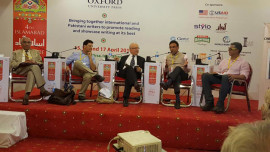
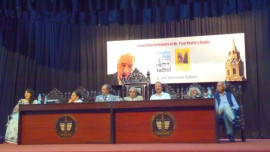
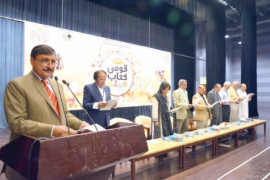


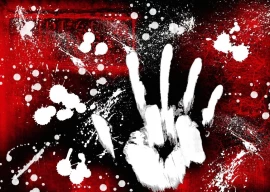

















COMMENTS
Comments are moderated and generally will be posted if they are on-topic and not abusive.
For more information, please see our Comments FAQ